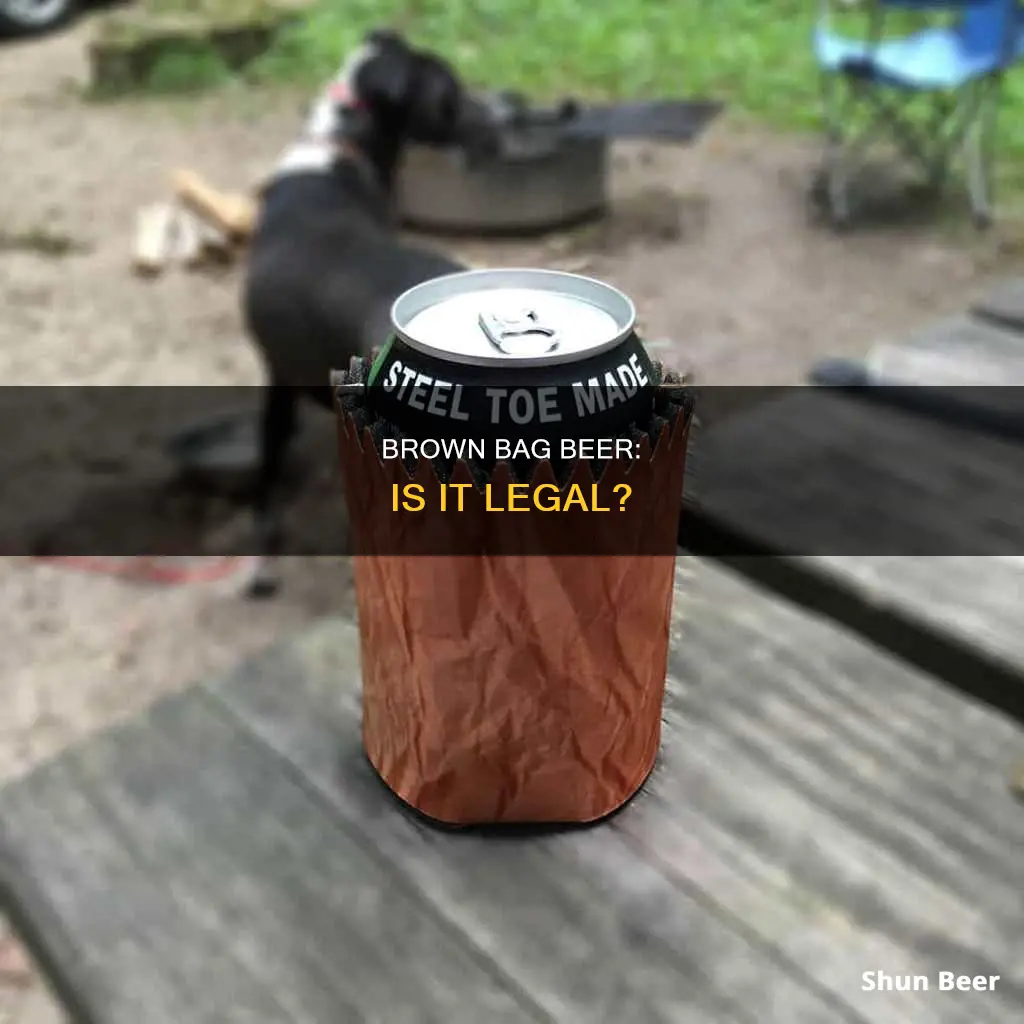
In the United States, it is common to see alcoholic beverages packaged in brown paper bags at liquor stores. Despite the privacy that these bags provide, they do not shield individuals from criminal charges associated with drinking in public. In fact, drinking from a brown paper bag may even attract more attention, increasing the likelihood of getting arrested. The practice of using brown paper bags is believed to have originated as a way to provide buyers with discretion when purchasing alcohol. While open container laws vary across states, most states prohibit possessing or consuming open containers of alcohol in public places, including sidewalks, parking lots, and apartment building steps.
| Characteristics | Values |
|---|---|
| Purpose | To conceal the fact that one is drinking beer in public |
| Effectiveness | Does not shield from criminal charges; may draw more attention and increase the chances of getting arrested |
| Reasons for Use | To hide open containers of alcohol; to provide privacy to the buyer; to keep the beer cold; to prevent condensation |
| Legality | Drinking in public is illegal in most places; open container laws vary from state to state |
What You'll Learn

Drinking beer in a brown bag does not shield you from criminal charges
Drinking alcohol in public where such consumption is prohibited by law is known as brown bagging. Brown bagging involves consuming an alcoholic beverage concealed in a brown paper bag. Despite the illusion of drinking something non-alcoholic, drinking beer in a brown bag does not shield you from criminal charges.
In the United States, liquor stores typically provide alcoholic beverages in brown paper bags. This practice is often associated with a law that prohibits liquor stores from selling alcohol without covering it. However, there is no legal requirement for liquor stores to sell alcohol in brown bags. The bag is intended for the consumer, providing privacy for their alcohol purchase.
While brown bagging may create the illusion of drinking a non-alcoholic beverage, it does not protect individuals from legal consequences. In most states, it is illegal to possess or consume an open container of alcohol in public areas, including sidewalks, public parking lots, and apartment building steps. The brown bag does not conceal the act of drinking and can even draw more attention, increasing the likelihood of getting arrested.
Furthermore, brown bagging does not exempt individuals from public intoxication charges. Public intoxication is illegal in all 50 states, and appearing drunk in public can result in legal consequences regardless of whether the alcohol is concealed.
It is important to note that open container laws vary across different states, and some cities, like Las Vegas, have specific regulations. However, the general principle is that drinking beer or any alcoholic beverage in a brown bag does not provide immunity from criminal charges related to public consumption or intoxication.
Ginger Beer: Kid-Friendly Beverage or Not?
You may want to see also

Liquor stores use brown bags to provide buyers with privacy
Drinking alcohol in public where it is prohibited by law has long been associated with the use of brown paper bags to conceal the alcoholic beverage. This practice, known as "brown-bagging", is believed to have originated during the prohibition era when drinking alcohol was illegal. People would drink alcohol from brown paper bags, creating the illusion that they were consuming a non-alcoholic beverage, and allowing law enforcement to turn a blind eye.
While the social stigma surrounding alcohol consumption has diminished since then, the practice of brown-bagging has persisted, particularly in the context of liquor store purchases. Liquor stores often provide buyers with brown paper bags, not as a means to enable public consumption, but rather to offer privacy for their alcohol purchases.
In some states, there are laws mandating that liquor stores sell alcohol only when it is covered or placed in an opaque package. This is intended to conceal the contents from public view. While a spokesperson for North Carolina's Alcoholic Beverage Control Commission noted that there is no such law in their state, the practice is still common. Liquor stores may also provide brown bags as a convenience to buyers, allowing them to avoid the additional cost of purchasing a bag in jurisdictions that impose fees for checkout bags.
It is important to note that brown-bagging alcohol in public does not exempt individuals from legal consequences. Drinking in public, even with a brown bag, can result in arrest or charges for public intoxication in any of the nation's 50 states.
Beer's Anti-Inflammatory Benefits: Fact or Fiction?
You may want to see also

Brown bags are used to hide open containers of alcohol
Brown bags are commonly used to conceal open containers of alcohol in public. This practice, known as "brown-bagging" or "brown-bagging booze", is based on the misconception that drinking alcohol from a brown paper bag is legal or socially acceptable. However, it is important to note that brown-bagging does not exempt individuals from alcohol-related laws and regulations.
The origin of brown-bagging can be attributed to laws in certain states that mandate the covering of alcohol purchases when leaving liquor stores. Liquor stores often use brown paper bags to comply with these regulations, providing privacy for buyers. However, this has created the misconception that drinking alcohol in public is permissible as long as it is concealed in a brown bag.
It is crucial to understand that brown-bagging does not provide legal protection from open container laws or public intoxication charges. In most states, it is illegal to possess or consume an open container of alcohol in public areas, including sidewalks, parking lots, and apartment building steps. Whether the alcohol is covered with a brown bag or not, individuals can still be arrested and charged accordingly.
While brown-bagging may give the illusion of drinking a non-alcoholic beverage, law enforcement officials and the public are often aware of this tactic. In some cases, brown-bagging could even draw more attention to the individual, increasing the likelihood of getting caught and facing legal consequences. Therefore, it is essential to be aware of and comply with local laws and regulations regarding alcohol consumption in public spaces.
In summary, brown bags are commonly used to hide open containers of alcohol in an attempt to bypass open container laws. However, this practice does not provide legal protection or exemption from alcohol-related charges. Individuals should be mindful of the legal and social implications of drinking alcohol in public and refrain from relying on brown-bagging as a means of circumventing the law.
Beer Hair Wash: Does it Work?
You may want to see also

Drinking in public where alcohol is prohibited by law
Drinking in public where alcohol consumption is prohibited by law can result in legal consequences, including fines, arrest, and even jail time. The penalties vary depending on the jurisdiction and the specifics of the incident. In some places, drinking in public is prohibited entirely, while in others, it may be permitted in certain designated areas or during specific events.
In the United States, open container laws vary from state to state, and it is essential to be aware of the local regulations. While some states, like California, have strict open container laws, others, like New Orleans and Las Vegas, are known for their more relaxed approach, allowing visitors to drink in public within certain restrictions. However, even in these cities, drinking in public parks or near religious sites or homeless shelters is typically prohibited. Additionally, drinking in public is prohibited in most Muslim-majority countries, whether alcohol is legal or only permitted for non-Muslim minorities.
It is worth noting that the practice of concealing alcoholic beverages in brown bags does not provide legal protection. While it may be a way to try to hide the act of drinking in public, law enforcement officers can still detect and enforce the relevant laws. The brown bags are commonly provided by liquor stores to comply with laws that mandate the covering of alcohol purchases, and in some states, alcohol must be bagged in a non-transparent bag before leaving the store.
The social customs and laws surrounding public alcohol consumption vary significantly worldwide. While countries like Norway, Poland, India, and Sri Lanka generally condemn or outlaw it, others like Denmark, Portugal, Spain, Germany, and the United Kingdom find it socially acceptable. Opponents of public drinking argue that it encourages overconsumption, rowdiness, and violence, while proponents counter that it is social issues that cause these problems and that public drinking helps normalize attitudes toward alcohol consumption.
Ginger Beer and Breastfeeding: Is It Safe to Drink?
You may want to see also

Public intoxication is illegal in all 50 states
Drinking alcohol in public is illegal in most places in the US. While the laws and penalties vary from state to state, public intoxication is generally prohibited across the country. In most states, public intoxication is considered a misdemeanour, which can result in fines, community service, or even jail time.
Public intoxication laws are designed to maintain peace and order in public spaces. They give law enforcement the authority to remove individuals who are visibly drunk or under the influence of drugs from public areas. These individuals may pose a threat to themselves or others and cause disturbances that affect the public.
The definition of "public place" can vary, and it is typically left to the court's discretion to determine whether a location is public or private. For example, a person's vehicle parked on a public street or in a public parking lot is generally not considered a private space. On the other hand, some states consider bars and restaurants as public places due to their accessibility to the general public.
It is important to note that simply being intoxicated in public may not always result in an arrest. In some states, public intoxication is treated as a public health issue, and individuals may be taken to a treatment facility or detox centre instead of being arrested. Additionally, some states, such as Nevada and Minnesota, do not have specific laws criminalising public intoxication.
While the brown bag covering a beer bottle may create the illusion that one is drinking a non-alcoholic beverage, it does not provide legal protection. Drinking alcohol from a brown bag in public is still considered a violation, and individuals can be arrested for possessing an open container of alcohol in public, even in places like Las Vegas.
Mixing Beer and Wine: What's the Harm?
You may want to see also
Frequently asked questions
No, drinking alcohol in public is illegal in most states. The brown bag does not shield you from any criminal charges. In fact, drinking alcohol from a brown paper bag may draw more attention to you, increasing your chances of getting arrested.
The practice of putting liquor in a brown paper bag may be to provide the buyer with privacy regarding their alcohol purchase. It is also done in an attempt to thwart any open container laws that may be in place.
Drinking alcohol in public is illegal in most states in the US. However, there are some exceptions, such as Las Vegas and New Orleans, where drinking in public is allowed.







